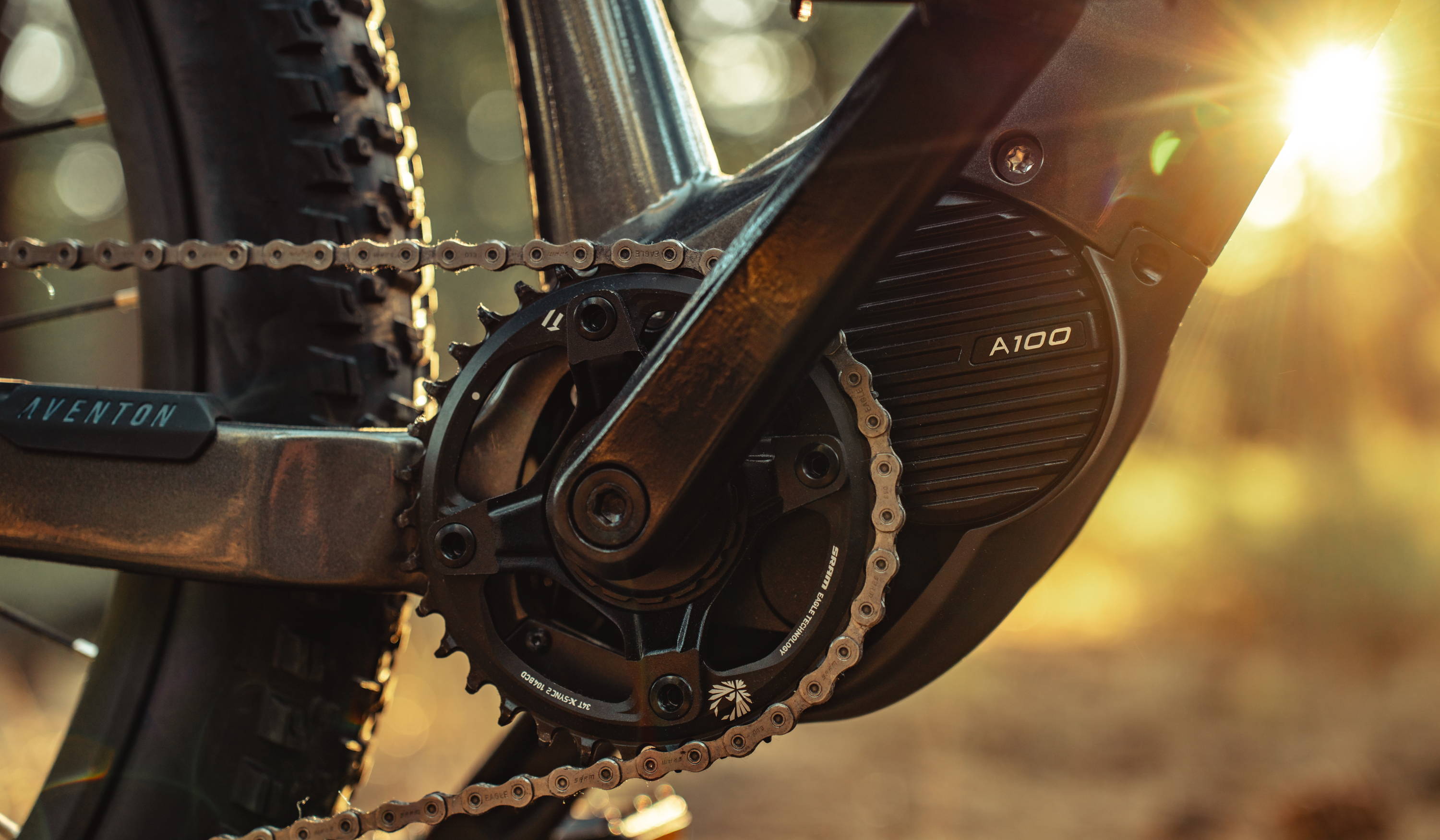
Aventon A100 Mid-Drive Electric Bike Motor: Uncovering the Magic Inside the Motor
April 4, 2024
The A100 mid-drive motor is a first for Aventon, and propels us into new riding terrain. Designing our own mid-drive motor made sense when it comes to our drive to be a completely vertically integrated company. Owning the development and design of this motor gives us maximum control.
When we want to make a change to improve the riding experience, we can do it right away. This allows us to listen to our riders and turn their feedback into solutions quicker than we could ever do with an outside supplier.
Another big advantage is offering our riders the ability to use Ride Tune and OTA (over the air) updates from the Aventon App. This way they have one app that does it all and still works with their hub-drive bikes as well.
A100 Motor Highlights
Aventon’s mid-drive motor was designed to give riders full control over their riding experience. By fine-tuning Ramblas’ three pedal assist levels, riders can customize how they ride, giving the bike a more natural riding feel similar to that of a traditional bike.
Power
The power of a motor is typically measured in maximum watts it can generate. A higher wattage motor facilitates maintaining a consistent speed during rides. Aventon A-100 motors ensure optimal support across a wide range of pedaling cadences, even exceeding 100 rpm, enhancing the overall feel for a more natural experience.
Ramblas’ motor maintains a nominal output of 250w, where "nominal" signifies the sustained power output during a standardized test over a specific time. Depending on the motor type, turbo mode with full power can deliver peak power of 750 watts. This is great for climbing hills and on trails, as well as rolling through city streets.
Torque
Torque, measured in newton meters (Nm), represents the motor's acceleration and climbing capabilities. A higher torque motor facilitates easier acceleration and climbing on steep inclines.
Ramblas’ motor can deliver 100 Nm of torque ensuring steady, natural acceleration and smooth climbing compared to other mid-drive motors, such as Bosch, Brose, Yamaha and Shimano that delivers only 90Nm. The torque gradually decreases as pedal speed increases, aiming to replicate the sensation of riding without motor assistance, preventing a sharp drop-off in torque.
Waterproof
Aventon’s mid-drive motor is IP67 waterproof rated. This means it has complete protection against dust and immersion in water for short periods of time. Products with IP67 ratings provide a higher level of protection compared to those that are merely "water-resistant." Water-resistant implies protection against water entry to some extent but doesn't ensure complete protection.
How The Aventon A100 Motor Works
In a mid-drive electric bike motor system, a cadence sensor serves a specific function alongside speed and torque sensors to provide a comprehensive and responsive riding experience. Here's how each sensor typically operates and contributes to the overall functionality:
Cadence Sensor
A cadence sensor measures the speed at which the rider pedals the bike, typically measured in revolutions per minute (RPM). This sensor detects the rotational movement of the bike's cranks or pedals.
By monitoring pedal cadence, the motor controller can adjust the assistance level provided by the motor to match the rider's pedaling speed. This allows for a smoother and more natural riding experience, ensuring that the motor assistance feels synchronized with the rider's pedaling effort.
Speed Sensor
A speed sensor measures the bike's speed by monitoring the rotation of the wheels or other components. This sensor provides information about how fast the bike is moving relative to the ground.
The motor controller uses this data to regulate the motor's power output and maintain a consistent speed, especially when the rider is not actively pedaling. It helps ensure that the electric assistance is proportional to the desired speed and maintains compliance with local regulations regarding electric bike speed limits.
Torque Sensor
A torque sensor measures the amount of force or pressure applied to the pedals by the rider. It detects the torque exerted on the cranks or pedals during pedaling. This sensor allows the motor controller to adjust the motor's power output based on the rider's pedaling force, providing a more intuitive and responsive riding experience.
The assistance level can be dynamically adjusted to match the rider's effort, offering more power when climbing hills or accelerating and reducing power when cruising on flat terrain.
By integrating all three sensors—cadence, speed, and torque—the motor controller can optimize the electric assistance provided by the mid-drive motor system in real-time, adapting to changes in riding conditions and rider input. This results in smoother acceleration, improved efficiency, and a more natural-feeling riding experience.
Ride Tune & Over-The-Air Updates
Ride Tune
Ramblas' Ride Tune, found in the Aventon app, enables motor support customization in Eco, Trail, and Turbo modes. While optional, it’s recommended for fine-tuning Assistance, Max Torque, and Acceleration, enhancing the riding experience either via the app or handlebar controls.
Assistance
Assistance is the motor's power contribution to the rider's effort. For instance, at 50% it adds 30 watts to your 60 watt output, while 100% adds 60 watts.
Max Torque
Max Torque can be adjusted to change the feel of how you ride. Decreasing the max torque provides a more natural ride feel and increases battery range.
Acceleration
Acceleration determines the bike's initial power from a stop. Higher settings mean quicker response, while lower settings offer a more natural feel.
Over-The-Air (OTA) Updates
Upgrade Ramblas for optimal performance with its intelligent over-the-air updates that give you instant software updates through the Aventon app without having to plug-in or go to a shop.





